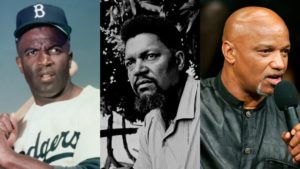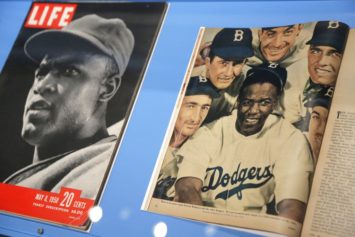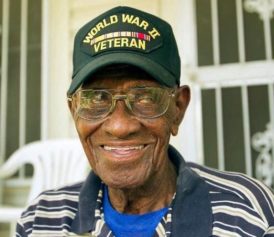
Jackie Robinson, Robert F. Williams, Geronimo Pratt
During World War II, James Jones was a member of the 761st Tank Battalion, the first African-American armored combat unit. He was nearly denied the chance to serve. Speaking on the Mississippi Moments Podcast in 2016, Jones stated, “General Eisenhower took the position that Black soldiers were not combat material, and it was his policy to use them basically as circus outfits.” Anti-Black military policies kept multitudes of enlisted Black troops tethered to demeaning assignments equivalent to their civilian employment experiences.
Latrine digging and custodial work were typical orders for Black fighters. And, if they were assigned to combat, for some, this meant fighting empty-handed. The 2005 documentary “Black Soldier Blues” features World War II veterans who were stationed in Australia to clash with Japanese forces. The film reveals, “Many Black soldiers weren’t even issued rifles to protect themselves.” Jay Crosby, a member of the U.S. Army’s 93rd Infantry Division, remembers a midnight guard duty assignment where his designated WWII weapon was a club. Hymie Samuelson, a white WWII veteran, recalled a fellow officer who routinely deprived Black soldiers of guns. Looking back more than a half-century, Samuelson spoke frankly about the motivations of his comrades: “There were a number of the [white] officers who were afraid of the Black man … that he would take a shot at them.”
Although most Black soldiers have not fired on their fellow white officers, many, as a result of their military service, have taken aim at racism. World War II veteran Roscoe Pickett detailed why Black veterans couldn’t shed their combat uniforms and return to their place below whites: “I knew that a Black man could do things other than mess around plowing with an ox, messing around cutting cross ties. That’s the thing that changed me.” Through military service, multitudes of Blacks acquired training, combat expertise and an elevated self-confidence that refused to submit to white tyranny.” Former Monroe, N.C., NAACP chapter head and WWII veteran Robert F. Williams preferred to recruit ex-soldiers to battle Carolina’s KKK because they “don’t scare easy.”
Before joining the Black Panther Party for Self Defense and being wrongfully imprisoned for nearly three decades, Geronimo Ji-Jaga Pratt served two combat tours in Vietnam. Along the way, he nabbed two Purple Hearts for being wounded in battle. In Jack Olsen’s biography of Pratt, “Last Man Standing,” Pratt details his Panther duties training Black teachers, children and church groups who were victims of racism in California. “Everything I taught was military preparedness, urban warfare, defensive structure … just what the elders sent me to the Army to learn,” Pratt said.
Jackie Robinson, a World War II veteran, used the racism he experienced in the Army to push pass white antagonism toward hi becoming the first Black major-league baseball player. His athletics triumphs inspired a generation of Black people to obliterate racist schemes to obstruct Black brilliance. Malcolm X confessed to Alex Haley that, during his years in prison, he was Robinson’s “most fanatic fan.” In fact, while Malcolm X hustled and draft dodged during WWII, Robinson served in the Army while regularly rebelling against its racist regulations. Robinson’s autobiography, “I Never Had It Made,” recounts his failed attempt to end racist cinema seating for Black soldiers and his court-martial for refusing to move to the back of the bus. The only baseball player to have his number retired by every major-league team confessed to being “naïve about the elaborate lengths to which racists in the armed forces would go to put a vocal Black man in his place.”
Through a variety of methods, Black veterans like Robinson demanded a new “place” for Black people. Author and Korean War veteran Neely Fuller Jr. concludes flagrant and perpetual racist violence gave returning Black soldiers no option but to combat racism. Fuller was granted emergency leave from the Air Force to visit his mother, who was plagued with terminal cancer. While riding a bus across Arkansas, Fuller, like Robinson, was not allowed to sit next to white passengers. “I had my uniform on, my ribbons, my mother’s dying of cancer. ‘You’re Black. Stand up, n—-r.’”
When Black veterans sacrificed themselves to the armed forces, yet were still denied justice, many emphatically dedicated the remainder of their lives to eliminating racism. Former NAACP president Walter White called them “a rising wind” that spread the fire for civil rights. Black soldiers’ service and bravery invigorated multitudes to join the battle to crush white supremacy.
Williams, Robinson, Pratt — audacious Black veterans who emboldened the effort to eradicate white supremacy and changed world history.
Gus T. Renegade hosts “The Context of White Supremacy” radio program, a platform designed to dissect and counter racism. For nearly a decade, he has interviewed and studied authors, filmmakers and scholars from around the globe.


